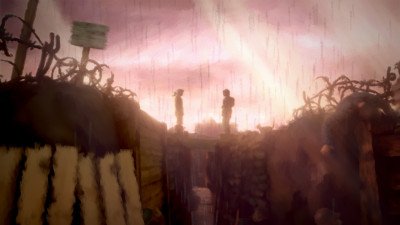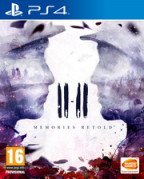A short introduction is in order.
My name is George Rowe, I’m the producer at Aardman for 11-11.
This is a two studio job, right?
Yes, it is a co-production between ourselves and DigixArt Studio which is a French company run by Yoan Fanise, who was an audio designer at Ubisoft for many years, where he made Valiant Hearts, which you maybe familiar with, and then left and founded his own company.
Same theme then.
Similar, yes. Same theme. I think he did that game and, you know, having been so alert about World War I and the stories, I think he still had more to say about it basically, after finishing Valiant Hearts.
Could you elaborate on each studio’s role in the production?
Sure. At Aardman we’ve been doing all the look development, all the art for the game, the animation and then DigixArt have been doing all the game design, programming and then we’ve all kind of done the story together. It is Yoan’s original baby and then we had various different writers involved. It’s kind of something that we’ve all had input into basically. We’ve been working through it for quite a while and everyone’s fed into it.
So what does 11-11 stand for?
11-11 is the end of the first World War, it happened on the 11th hour and the 11th minute of the 11th day of November. So this year it’s actually the centenary, a hundred years, since the end of the war, this year. And so the game culminates up until that point. The game finishes at 11-11 of 1918 and is released a hundred years later, actually on November then 9th so two days before that, this year. It’s all about leading to that moment, the end of the war.
How did you end up with that particular look? We have no real issues with it, we enjoy all kinds of experimentation but we can’t help but feel that it’s going to weird out a lot of gamers.
I think some people are going to hate it. I think some people are going to absolutely hate it. We wanted to do something different, you know. And it was kind of, originally, we wanted to do something of the art style of around the time of the first World War basically. So that was kind of the start, the birth a lot of modernist painting movements, impressionism which the game is kind of loosely based on, it’s like a painting with a slightly impressionist style, then also things like cubism and futurism which are actually other art styles we experimented with at the beginning of the production. But then as soon as you start going down a kind of cubist route things start looking low poly, unlike other styles found in games. The important thing is we wanted to do something different. We wanted to do something that kind of connected with the emotional heart of the story and I think, paintings are obviously a subjective medium you know. We very much used painting style and different colours and things that are not used in games, it’s not a realistic rendering of the world. We used colour, we used painting art to kind fo show the emotional state of the character.

The first World War isn’t exactly the go-to choice for the game industry as a whole so how did you make the decision to go there from the get go?
I think, as you say, for the game industry, World War I isn’t really a very touched subject matter, which is strange because it is this massive, massive event which impacted the formation of Europe, which impacted everyone’s lives, it’s so important, such an important event.
And made sure that World War II eventually happened.
Yeah. I mean that’s why we shouldn’t forget about this kind of things, we shouldn’t think that war is just running around shooting people. This game is set in a war but it’s not really about the war. It’s about two characters in that war and how the war affects their relationships, how it affects who they meet, how it affects their family and things like that. It think it’s important, at a time like this when the world seems to become a bit more fragmented and broken apart, that we remember that that can lead to these really horrible things that we don’t want happening any more. So I think we can kind of raise awareness about World War I and the horrible events that happened, try to make sure they never happen again, and I think raising awareness of it can only be a good thing.
At some point we heard the line that this game was a game about good way before you tried making it a good game to begin with. And there’s supposed to be a constant conflict between one’s humanity and sense of duty.
Yeah.
But any conflict at any given time has cost. When we first tried the game, we didn’t really feel we had a chance to get a sense of that possible cost. There a sequence in which we had to choose whether to shoot the other protagonist or not, we chose not to, but the following sequence gave us the impression that even if we had, the plot would have basically stopped us.
Yeah. So, I mean, you make choices all the way through the game, but it’s not like it’s a massive branching system throughout the game. Basically you make choices all the way through it and that affects the characters’ kind of principles in life, like how they see the world and how they affect it. But I think also the core of the game is about loyalty about those two people who meet and then the kind of loyalty towards their family and friends and to their nations and things is tested. So you make all these choices all the way through and you’ll see it affects basically what happens in the end. I don’t want to give a way too much but you’ll see when you get to the end that it very much affects what happens and how the character kind of feels about what’s happened.
Going back to the World War I theme, we’re at a point in time where it’s difficult to do actual research based on first-hand sources.
Yeah.
Even the children of those that fought in the war might not be alive at this point.
Very true.
So everything is secondhand and makes the whole thing tougher. At the same time, the theme, as we said earlier, the underrepresented in the games industry. So we suppose this leaves you with a different kind of responsibility to research anything involved. How did you go about that, making sure you’re true to the original feeling, the sources and the humanity of it?
Sure. That’s a very interesting question and there’s a couple of points there. So first of all we worked with a couple of military historians, an English historian and a German historian, because, obviously, it was very important to us that this was a balanced portrayal of the war. It’s not Germany painted as bad guy like in any other war game and things like that, we wanted it to be a balanced, real portrayal.
After all, Germany wasn’t actually the instigator of the war.
Exactly. So we worked with the historians who, as well as advising us on the uniforms they should be wearing, what weapons should people be carrying and all that kind of thing, gave us a fact check on the structure we built around the war. Because as I said the game is set in the war but isn’t necessarily about that. It all takes place at real events of World War I but it’s not just about that, it’s about those two characters’ lives.
Now, obviously, showing the German side, for gaming at least, is automatically a unique perspective. Even so the Great War was quite weird in the sense for the first time it put in conflict way too different nations from different continents and much of the time no one really knew what they were fighting for. That ambivalence, that lack of clarity we think it gives way to very interesting stories depending on the viewpoint. Still, you ended up with the, let’s say, the easier choices. It could have been about Germany and Austria, Canadians, the English, the Scottish, the Irish not so much. You definitely had more choices to pick from. So why not go there? Why not try something truly different?
I think, as I say, it’s not necessarily just about the things that happen in the war, it’s really a story of the two men.
Yes but a different nationality gives you room for different stories and perspectives. You don’t have to go into the war to do that.
I totally agree. I mean, you do meet some other characters from different backgrounds in the game, certainly for the Allies and the British side, there was a lot of Sikh soldiers from the Indian part of the British Empire, you meet some of those during the game and hear about their stories and then you meet others from other backgrounds. We wanted it also to be understandable to the players, you know. As you say people don’t have much connotation about the World War I to start off it, I think you maybe need to ground it slightly in a story they already understand, so they can get more from it. You know, if it was about something people didn’t totally understand maybe wouldn’t get as invested in the story from the start. But I do get your point. I mean there’s so, so much happened during World War I, on a smaller level and on a larger level. There’s millions of untold stories that hopefully people will dig into more.
Even the Australians showed up.
Oh yeah. Yeah, yeah.
That by itself is kind of crazy.
I mean, it’s World War. It affected the whole world, not just the local area it was in. People were coming from all over the world. Obviously the British Empire at the time was kind of spread, across the world, and World War I was the start of its downfall. But yeah it affected everyone, from very different backgrounds.
You said you’re interested in doing more stories.
Hopefully, as they say, there’s so much more to say about the first World War and we haven’t really thought about a specific sequel to this or anything but, you know, you read letters from the time, you read journals from the time and I encourage anyone to go to a museum etc. and do their own reading and research into World War I because it’s so fascinating. It’s terrible and it’s horrific but we should understand these things so that they don’t happen again. And there’s just so much untapped, interesting things I think we should look into.
In that sense do you think that you, as a couple of teams, but also as the industry as a whole and, ultimately, the medium itself have some responsibility to taking such things and by codifying them, in gameplay terms, in a way preserve them and disseminate them to a gaming culture that’s not always the best target group but, the medium being what it is, thankfully, we’re stuck with it? So if you think it’s also your responsibility, how do you manage that on a personal level? It can be intimidating a thought.
I think you’re 100% right that the game industry the film industry, all these people has a responsibility in some ways to make sure stories like this and history isn’t forgotten. It’s part of the reason why we have this kind of things. I mean, it’s an advanced form of people sitting around the campfire telling stories of what happened before. And as the games industry is maturing, which I think it is now, you know, games aren’t just, don’t just have to be instant gratification mechanics, games can be stories, games can push the boundaries. And something like this, which hopefully will get some people that might not know anything about World War I, might get them to understand a bit about it. Even if it happens to one person, I think that we’ve done a good job. Even if one person goes “wow, I never knew that” and wants to find more about World War I and maybe it changes their opinion on these events, I think that can only be a good thing. So hopefully, we’ll make some people more interested in it.
Maybe it’s either that or BBC History Extra. Thanks for your time.
Thank you.
Σημαντική επένδυση του επιχειρηματία Βαγγέλη Μαρινάκη στο gaming






Για την καλύτερη εμπειρία σου θα θέλαμε να σε παρακαλέσουμε να το απενεργοποιήσεις κατά την πλοήγησή σου στο site μας ή να προσθέσεις το enternity.gr στις εξαιρέσεις του Ad Blocker.
Με εκτίμηση, Η ομάδα του Enternity